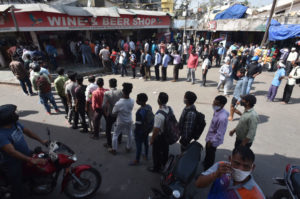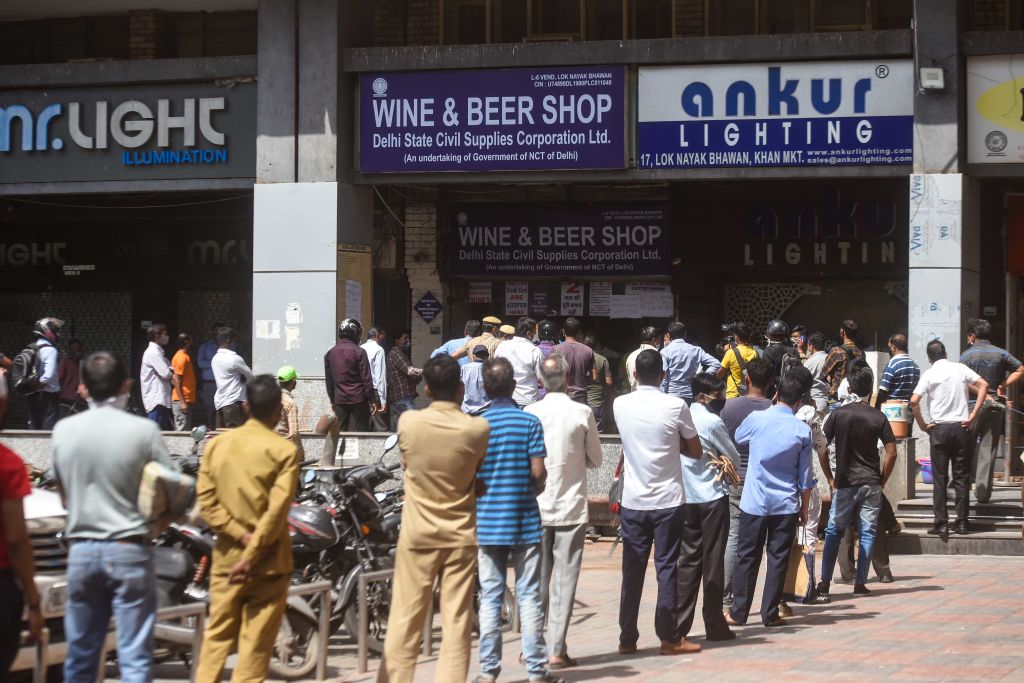The dangerous myth that alcohol helps contain Coronavirus has cost many people their lives. Lockdown is an excellent opportunity to beat bad habits and addictions
Alcohol, logically so, is not part of the essential commodities—though some would beg to differ. So when the lockdown was announced in Delhi, people gathered in large numbers outside the liquor shops—forming long serpentine queues—risking them and their family of the infection. The Confederation of Indian Alcoholic Beverage Companies (CIABC) that represents domestic liquor makers pleaded with the Delhi Government, citing the Maharashtra example, to allow the home delivery of alcohol.
Referring to the long queues by dozens of anxious people outside the liquor shop, CIABC Director-General Vinod Giri, called it “the panic reaction from the public, driven by their memory of lockdown extensions last year.” He asserted, for lakhs of people all over India “alcohol is part of regular consumption basket that they do not wish to be deprived of,” and added that the decision of “Maharashtra to allow home delivery of liquor, for example, has helped contain panic reaction to lockdown there. We urge the Delhi Government to think of such steps.”
In the past couple of weeks, many are getting desperate, and there’s no legit way to procure alcohol and is available at a premium (1.5 times higher) in the black market, very much like medicines and oxygen is available in the capital at a premium. A 37 years old multinational executive, Bijay Prakash (name changed on request) who lives in CR Park, South Delhi, with his wife and 12 years old son, is a regular drinker. He procures alcohol at a premium as his personal stock is dwindling.
Some are not so resourceful like Bijay and are fairly desperate for their daily quota of alcohol. There were so many cases of people dying or falling sick after consuming sanitizer during the lockdown last year that had lasted for months. Such cases were reported not only from Delhi but across the country, even from Europe—the logic being that since sanitizer contains alcohol, kills Coronavirus, can also be used as a beverage with medicinal qualities.
The faulty logic was extended further, since alcohol-based sanitizer kills coronavirus, drinking alcohol, is also a sure way to deal with the deadly virus inside the body.
This faulty presumption was so widespread that the World Health Organization (WHO) issued a detailed factsheet to inform about the health risks and hazards. Also to counter the misinformation that is being spread through social media and other communication channels about alcohol and Covid-19. The unequivocal fact is that in no way the consumption of alcohol protects from Covid-19 or prevents from being infected by it. This detailed factsheet is coordinated by Carina Ferreira-Borges, Programme Manager, Alcohol, Illicit Drugs and Prison Health, under the leadership of Dr João Breda, Head of the WHO European Office for the Prevention and Control of Noncommunicable Diseases.
“Ethyl alcohol (ethanol) is the substance in alcoholic beverages that is responsible for most of the harms that arise from their consumption, irrespective of whether it is consumed in the form of wine, beer, spirits or anything else,” is a fact. Further, other toxic substances that may smell like ethanol can be added in adulterated beverages that are produced informally or illegally, or they may be present in alcoholic products that are not intended for human consumption, such as hand disinfectant,” document clarified—may lead to blindness and kidney disease, and death. Also, the evidence suggests that there is no “safe limit”, the risk of damage to your health increases with each drink of alcohol consumed.
During the lockdown, families are crammed inside their houses for weeks, which raises anxiety. Bijay Prakash concurs, “I dealing with aggressive thoughts and pent-up frustration and working from home is stressful.” He’s tempted to think that “alcohol helps you to cope with stress.” That’s not true, alcohol is known to increase the “symptoms of panic and anxiety disorders, depression and other mental disorders.” He’s warned that the heavy use of alcohol increases the risk of acute respiratory distress syndrome (ARDS), one of the most severe complications of COVID-19. Alcohol also increases the risk, frequency and severity of perpetration of interpersonal violence such as intimate partner violence, sexual violence, youth violence, elder abuse, and violence against children.

It’s a big myth that “consuming alcohol destroys the virus that causes Covid-19” instead consuming alcohol is likely to increase the health risks if a person becomes infected with the virus.
“Alcohol (at a concentration of at least 60% by volume) works as a disinfectant on your skin, but it has no such effect within your system when ingested, neither it kills the virus in the inhaled air doesn’t disinfect your mouth and throat. On the contrary, beer, wine, distilled spirits or herbal alcohol has a deleterious effect on your immune system and will not stimulate immunity and virus resistance.
“Beware of claims made online that alcohol offers any essential benefits that you really need to have during your period of home isolation or quarantine. Alcohol is in no way a necessary component of your diet and lifestyle,” the WHO document warns, last not the least, for God’s sake, if you do not drink, do not let any supposed health reason or claim persuade you to start.
In fact, the lockdown period is an excellent opportunity to overcome bad habits and addictions. Bijay is on the wagon for the rest of the lockdown. “I’m doing this for my family,” he says.





